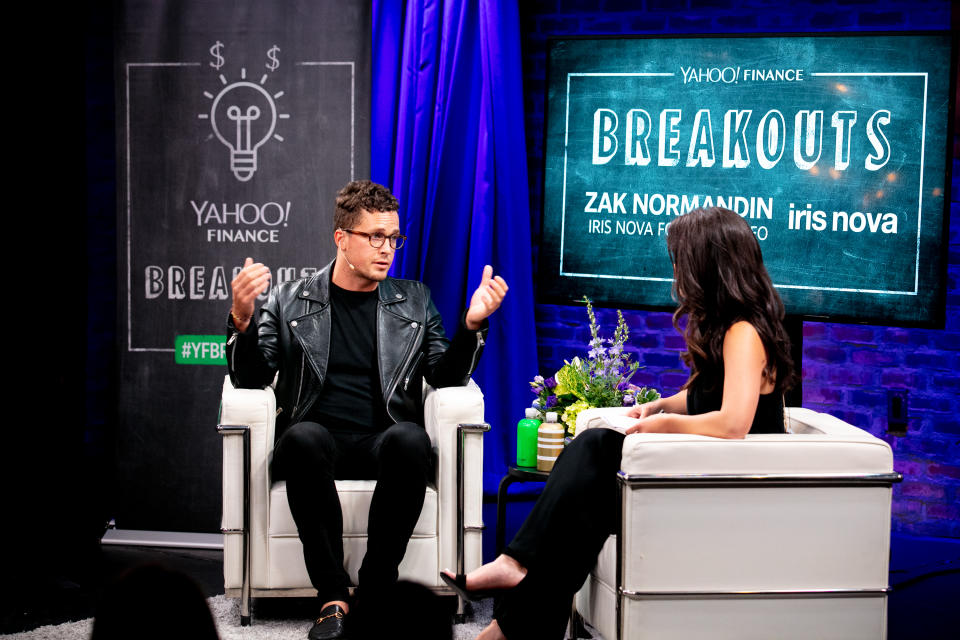The future of shopping will be by text: Iris Nova CEO
Buying stuff exclusively by text will be the next big thing for consumers, according to Iris Nova CEO Zak Normandin.
Normandin’s venture Iris Nova serves as the parent company of the flagship beverage brand Dirty Lemon, which has sold more than 2 million bottles since inception in 2015, largely to millennial women.
Coca-Cola (KO) has backed the New York-based company, which sells low-calorie, functionally focused lemon-based beverages infused with wellness-intended ingredients like matcha, collagen, ginseng and valerian.
But as Normandin sees it, the crux of his company’s disruption comes not from the beverages themselves, but the technology underpinning their distribution.
For Dirty Lemon, 90% of customer orders have taken place completely over text message to date. With this, consumers send an SMS to the company’s main number to place their orders for deliveries of the citrusy beverages. The same text-based system applies to customers shopping in person at one of the company’s brick-and-mortar locations in New York City – no cashier required. A couple quick thumb-taps later, and the order is complete.
“We think, in the future, that brands are going to have a phone number and a website,” Normandin said during an interview during Yahoo Finance’s monthly Breakouts series. “The phone number is not going to be for picking up the phone and calling a brand. It’s going to be to pull our your phone and text the brand and say, ‘I want more product. I’m checking on my order’ ... It’s all going to happen over messaging.”
‘Conversational commerce’
It all comes down to embracing what Normandin refers to as “conversational commerce,” or a more intimate means of interfacing with customers as they shop for goods used in their daily lives.
“The idea of conversational commerce is far more efficient and more frictionless than any other option on the market right now,” Normandin said. “Downloading an app has a lot of friction around it. And going to the store, I would argue, the grocery store especially has the most friction because you have to go into your car or walk down the street, carry bags home.”
He added that in Asia, messaging and goods and services transactions have long been entwined. Companies like China’s Tencent-owned (TCEHY) WeChat and Japan’s chat app Line include payment integrations, with the latter supported by a partnership with Visa (V). Facebook (FB) has been inching toward the wide launch of a WhatsApp payments integration in India, and already allows sending and receiving money in Messenger.

And on a broader scale, consumer behavior has increasingly tilted in favor of e-commerce, with text-based ordering representing one offshoot of that. A recent report from eMarketer estimated that U.S. consumers will spend more than $586 million on e-commerce in 2019, up 14% over last year, and comprising 10.7% of total retail spending. And most of that e-commerce spending is expected to take place on mobile devices.
But the text-based means of communication has also carried privacy concerns with it, and the potential for abuse of the more intimate means of interfacing with customers. Normandin, however, has maintained these haven’t been an issue for Dirty Lemon, noting during a public meet-up last year that the company only pushes messages out to customers when they’re actively placing an order.
And Iris Nova isn’t alone in its embrace of the text-based ordering system. Other ventures including Walmart’s (WMT) JetBlack premium personal shopping service have also deployed text-to-order as a way to offer a more seamless customer experience, allowing customers to place orders for home goods essentials or ask for gift recommendations all via text.
Iris Nova’s previous investments have reflected the company’s ambitions for scaling its text-based platform. Last year, Iris Nova acquired the chatbot company Poncho, which had originally been designed to tell users the weather, for an undisclosed sum. And Normandin expects that this technology will continue to support Iris Nova’s future growth.
“We're building technology to support the next iteration of distribution, of consumer products, not just beverage. And I think that's an important note,” Normandin said. “We're testing this with beverage right now, but the technology that we're developing could apply to beauty, personal care, home goods, anything that has a high velocity that you're reordering on a regular basis.”

—
Emily McCormick is a reporter for Yahoo Finance. Follow her on Twitter: @emily_mcck
Read more from Emily:
There won’t be ‘billion-dollar beverage brands’ in the future: Iris Nova CEO
Iris Nova CEO calls his company the ‘Netflix’ of the beverage space
Tech companies like Lyft want your money – not ‘your opinion’
Follow Yahoo Finance on Twitter, Facebook, Instagram, Flipboard, LinkedIn, and reddit.
Read the latest financial and business news from Yahoo Finance

 Yahoo Finance
Yahoo Finance 